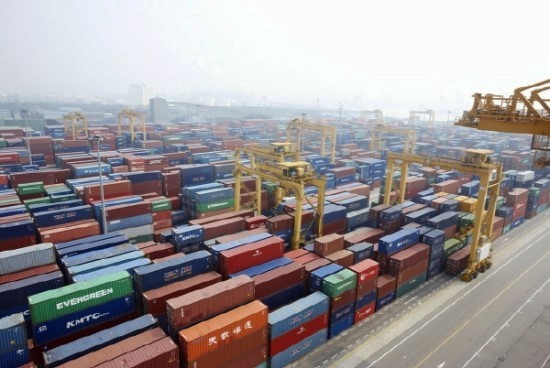US import curbs to deal heavy blow on S. Korean economy: report
By Son Ji-hyoungPublished : July 5, 2018 - 15:20
The looming US import curbs including tariffs and quotas on South Korean goods are expected to take a toll on Korea’s economic indicators, a report showed Thursday.
In the wake of regulatory measures starting this year on steel, washing machines and solar cells, Seoul is likely to see some $2.5 billion cut in exports and 16,000 potential job losses here and abroad.
In the wake of regulatory measures starting this year on steel, washing machines and solar cells, Seoul is likely to see some $2.5 billion cut in exports and 16,000 potential job losses here and abroad.

According to a report released by the National Assembly Budget Office, a Korean steel import quota to the US -- equivalent to 70 percent of annual average imports from 2015 to 2017 -- will cause a $1.2 billion loss in exports for five years until 2022.
In addition, the quota on steel products announced for Korea would lead to losses of $3.4 billion in production, $607.3 million in added value and 6,538 in the number of potential jobs.
This is part of economic costs Korea is expected to bear from US import regulations, as projected in the report loosely translated as “An analysis of ripple effects on Korea from US import restrictions.” The report used the input-output model as a tool for estimating the volume of losses.
Other than steel product exports, Korean exports of washing machines and photovoltaic cells to the US will see declines of $756.4 million and $471.6 million, respectively.
The US in January decided to slap tariff-rate quotas for three years until 2020 on residential washing machines and parts from Korea, home to powerhouses such as Samsung Electronics and LG Electronics.
On the other hand, US tariffs on imported solar cells and modules are expected to be effective for four years starting this year. The tariff rates will gradually decline from 30 percent in the first year and 15 percent in the fourth year.
As a result, a potential 8,146 jobs will disappear at makers of washers, while solar cell makers will see 1,309 potential job losses.
The US regulations are designed to provide relief to US manufacturers, in a move to contain non-US manufacturers’ growing presence in the US.
The volume of losses was calculated based on the average dollar-to-won currency exchange rates from January to May this year, at 1,072 won against the greenback. The estimates are based on “conservative approaches” to gauge aftereffects of US regulations.
By Son Ji-hyoung
(consnow@heraldcorp.com)
In addition, the quota on steel products announced for Korea would lead to losses of $3.4 billion in production, $607.3 million in added value and 6,538 in the number of potential jobs.
This is part of economic costs Korea is expected to bear from US import regulations, as projected in the report loosely translated as “An analysis of ripple effects on Korea from US import restrictions.” The report used the input-output model as a tool for estimating the volume of losses.
Other than steel product exports, Korean exports of washing machines and photovoltaic cells to the US will see declines of $756.4 million and $471.6 million, respectively.
The US in January decided to slap tariff-rate quotas for three years until 2020 on residential washing machines and parts from Korea, home to powerhouses such as Samsung Electronics and LG Electronics.
On the other hand, US tariffs on imported solar cells and modules are expected to be effective for four years starting this year. The tariff rates will gradually decline from 30 percent in the first year and 15 percent in the fourth year.
As a result, a potential 8,146 jobs will disappear at makers of washers, while solar cell makers will see 1,309 potential job losses.
The US regulations are designed to provide relief to US manufacturers, in a move to contain non-US manufacturers’ growing presence in the US.
The volume of losses was calculated based on the average dollar-to-won currency exchange rates from January to May this year, at 1,072 won against the greenback. The estimates are based on “conservative approaches” to gauge aftereffects of US regulations.
By Son Ji-hyoung
(consnow@heraldcorp.com)




![[KH Explains] No more 'Michael' at Kakao Games](http://res.heraldm.com/phpwas/restmb_idxmake.php?idx=644&simg=/content/image/2024/04/28/20240428050183_0.jpg&u=20240428180321)














